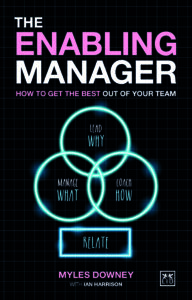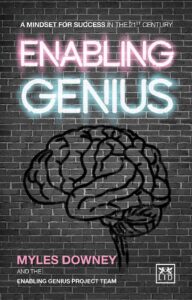|
Discovering Your Genius for Leadership by Myles Downey & Ian Harrison
By Guest Contributors Myles Downey & Ian Harrison, Authors of The Enabling Manager
Performance starts with identity.
A leader’s performance starts with Leader Identity.
A leader’s performance is central to the success of an organisation, division or team, particularly in a world that is changing fast. But few leaders know, with any real certainty, what it takes to perform to their highest levels. However, from studies of high-performing people across multiple disciplines (The Enabling Genius Research Project 2012 – 2014), several principles can be identified and used to advantage.
One of these principles concerns Identity. Identity, your sense of self, is essential to our individual evolution as human beings: it governs how we perform, learn, promote ourselves, and take our place in the world. You can’t be yourself until you know who and what that self is. And the better you know, the easier it is to express yourself and, critically, be successful.
There’s a second reason why understanding your genius as a leader is critical and it concerns your team. To have a relationship with you your team need to have a sense of who you are. They need to get a handle on you as a leader. This means that they can have some certainty about the person who shows up day-to-day and can feel confident making plans and agreements with you. This means that as someone who leads others (you don’t need a position of leadership to lead) you need to get clear about two things: who you want to be and how you want to show up as a team leader.
Take some time to reflect on your different roles: at work, at home and in the community. Notice how you turn up to each of those roles. We’re confident what you will find is that without becoming a different person you turn up in different ways in each different context. Depending on the role you are fulfilling, different parts of your personality will come to the foreground. Identifying and developing the different ways you show up is key to being successful.
The Construct View of Identity
We are suggesting that identity is not something fixed but rather it’s a construct:
something that is put together in one’s mind, a mental model, as opposed to a tangible object. Your identity is something that emerges as a function of what you inherit physically and mentally, what you absorb from your family environment, your social environment and then from all your experiences and memories.
Memories are different from the experiences that gave birth to them. What you retain, delete or distort from the original experiences – your memories – become a part of how you think of yourself. Add to this the unique manner in which you construe all of this: how exactly you put it together, understand it, hold it. Unconsciously, you are constructing an identity, a sense of self, which will survive and, with luck, thrive in its environment – that ‘is fitting’, to borrow from Darwin.
Julian Baggini, philosopher and author, in his book ‘The ego trick’, explores these two
competing ideas. His argument favours the construct conception and, with others, puts the label ‘Bundle Theory’ on it. He suggests our sense of self emerges from our thoughts and perceptions but that there is no “control centre”. This is the ‘trick’ of the title of the book. He uses the word trick, not as a magician might but as a mechanic would:
So if your car needs repair and the mechanic can’t get the part, he might have a ‘trick’ that gets the car working as normal anyway.
He goes on to say:
There is no single thing which comprises the self but we need to function as though there were. As it happens, the mind, thanks to the brain and body, has all sorts of tricks up its sleeve that enable us to do this. Because it succeeds, selves really do exist. We only go wrong if we are too impressed by this unity and assume that it means that underlying it is a single thing. But self is not a substance or thing, it is a function of what a certain collection of stuff does.
From a purely practical place, the notion that identity is a construct is most useful as it takes us away from identity as a fixed thing and suggests that it is something that emerges over time, is far more plastic than commonly thought and can, to a significant degree, be shaped. Crucially, an individual can choose to ‘turn up the volume’ on some components of the ‘bundle’ and turn it down on others. In this way, identity can and does evolve.
Before considering how you might understand your unique identity as a leader, we need to talk about Genius. Genius is normally used to describe someone of exceptional abilities, whose performance rises above that of the rest, usually in a specific domain. The implication of this view is that while it is generally agreed that human beings have vast potential, for the majority it’s capped just short of genius! Really? When you realise that most of the people considered to be geniuses are almost exclusively male and dead, you might conclude that the criteria for genius status are not fit for purpose. Maybe there’s a different understanding of genius, one that serves us all better in a time when we are faced with so many problems and so many opportunities – Genius is available to all. Or, as Buckminster Fuller said:
All children are born geniuses. 9,999 out of every 10,000 are swiftly, inadvertently degeniused by grownups
Bringing the Identity and Genius notions together, we propose that you have a unique individual genius as a leader. One approach to discovering your unique individual genius would be to describe what a great team leader would look like in your context. Think about the way they think about themselves, the way they interact with the team, what they do, how they say things. You might even like to think about how they dress or their physical posture. Make your description as rich and full as you can. Once you have your description ask yourself the following questions:
- How do I need to think about myself in my role?
- How do I need to interact with my team to enable them to be the best they can be?
- What do I need to do to be a great team leader?
- How do I need to communicate with my team?
- What clothes will make me feel like the leader I want to be?
- How do I need to hold myself physically to feel like the leader I want to be?
Another consideration in how you turn up for your team is to consider your intent. What is it that your role requires? What outcomes do you want, or need, to achieve? One helpful way of thinking about this is to think in terms of Love, Will and Desire.
Love is so many things to so many people that we are not going to risk a definition – or write a poem, which, other than songs, seems to be the most common route to understanding and communicating about it. Not something for this article! However, it is accurate to suggest that love’s fundamental function is to bring people together for a variety of purposes: procreation, nurturing and acting together for the common good either to protect against threats or to achieve a collective aim such as growing a crop or hunting.
Will is the capacity to have desires and to act intentionally toward achieving them.
- Will is ‘head’; rational intellectual while love is ‘heart’; intuitive.
- Will seeks control, love trusts, lets it happen.
- Will looks for structure, love for process.
These two basic human attributes can be seen as being in competition with each other. Seen that way the solution is to find a compromise. But there is another way of approaching them and that is to bring them together in a synthesis. To do this we need to look at something in us that is at a higher level, something that transcends will and love but which harnesses them both. That function can be fulfilled by our desires. ‘Love’ often defines our desires but ‘will’ enables us to do what we need to do to realise them.
True desire is congruent with one’s sense of identity; one’s sense of self and one’s sense of purpose. It embraces the best of will and the best of love. It is persistent and endures over time, it flexes in the face of changes in circumstances. It is a primary source of energy. Desire emerges from within; it is primarily an intrinsic motivation.

What we want (desire) from a situation changes the way love and will turn up in our attitudes and actions. A team leader who wants to be “in control” and “in charge” will turn up in a way in which their will is dominant. A team leader who wants to be “liked” will turn up in a way in which “Love” is dominant. If leadership is all will and no love, then it will be domineering and very definitely in the realm of ‘Command and Control’. On the other hand, if leadership is all love and no will then you may form a close-knit group of friends but there will be no direction. Effective team leaders turn up with a combination of love and will that enables them to realise what they want their team to achieve.
Discovering your own genius for leadership is to understand how your personality needs to turn up to get the best out of your team and to be clear about your intent as a leader. Are you simply looking for compliance or do you want to build a team that is engaged and able to access higher levels of performance?
You bring a unique personality to your leadership, shaped by your own unique background. No one else will lead quite as you do. It is time to discover your unique genius for leadership.
ABOUT THE AUTHORS
 Myles Downeyis a leading authority on performance, coaching and leadership, focused on ‘Enabling Genius.’ He is widely regarded as one of the foremost Leader Performance coaches in Europe. As an author, he has written three clas-sics: Effective Coaching, Effective Modern Coaching and Enabling Genius. His coaching books have together sold more than 300,000 copies. The founder of The School of Coaching, he has worked across the globe in most business sectors. He is partner with People Squared Ltd, where he helped create a unique mobile learning platform Boost Leadership, which facilitates behavioural change at scale. In 2017, he worked with the coaches of the England Rugby squad.
Myles Downeyis a leading authority on performance, coaching and leadership, focused on ‘Enabling Genius.’ He is widely regarded as one of the foremost Leader Performance coaches in Europe. As an author, he has written three clas-sics: Effective Coaching, Effective Modern Coaching and Enabling Genius. His coaching books have together sold more than 300,000 copies. The founder of The School of Coaching, he has worked across the globe in most business sectors. He is partner with People Squared Ltd, where he helped create a unique mobile learning platform Boost Leadership, which facilitates behavioural change at scale. In 2017, he worked with the coaches of the England Rugby squad.

Ian Harrison works with leaders and their teams around the UK, supporting them to create great places to work. He is the creator of Gratitude Mapping, a tool being used by teams to strengthen connections, break down silos and build positive cultures where people feel valued. Ian spent 19 years as the minister of churches in and around the West Midlands. He has sat on the board of charities and for two years was part of the volunteer team that delivered TEDxBrum. He lives in Wolverhampton but at the weekend you’ll find him at Elwood Park, watching Blackburn Rovers.
Suggested Reading

A practical, modern book for managers and leaders, at any level and in any department or company, who need to know how to get the best from their teams in a 21st Century business world. The world of work and the needs of people in the workplace have changed to the extent that the old models no longer work. Today’s manager cannot rely on “command-and-control” and a culture of compliance to get their job done.

This fascinating book examines the nature of genius in human beings and what it takes to go beyond mediocrity and ordinariness. Written by a leading thinker and consultant in human performance, together with contributions from other experts in the field, the book identifies three specific kinds of genius that are within everyone’s reach: unique individual genius (in a specific discipline, craft or skill set); genius in any discipline, craft or skill set; moments of genius (that occur as spontaneous, unplanned events); and collective genius (the coming together of individuals to deliver something extraordinary).
